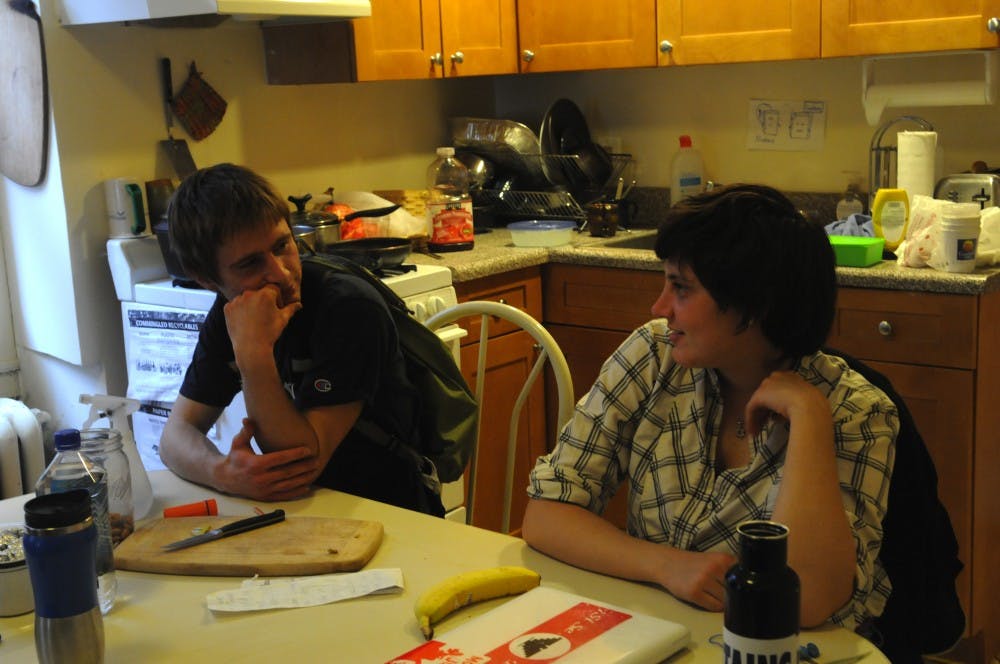At one house on the outskirts of campus, cooking mishaps in the kitchen commonly interrupt discussions about social justice.
About seven months after it was first opened, Penn Haven — a housing co-op located at 40th and Chestnut streets — is still providing its residents with an alternative option to the University’s mainstream social scene. The co-op, centered on the theme of social justice, embraces the idea of communal living, in which chores, food and leadership are distributed evenly among its nine members.
College sophomore Penny Jennewein, who was one of the original planners of the co-op, believes that “the sense of community that we’ve been able to create is pretty amazing, given the stresses of Penn’s student life.”
The first year, however, has not come without its bumps.
Jennewein said she had not anticipated the extent to which the lives of “typical” Penn students and the ideals of co-op residents would clash.
“It’s not something that’s perfect for students’ lives because we have different schedules every day,” Jennewein said. “A co-op is supposed to be a community and a home, but at Penn, the culture of eating out and pre-professionalism don’t always go hand in hand with the co-op style of living.”
Wharton senior and co-op resident Russell Trimmer said his least favorite part of co-op style living is the time it takes for the group to make a decision, due to the democratic system in place.
The co-op has established a system and format for moderating weekly discussions, which cover both practical matters and intellectual topics. The members take turns serving as facilitators and note-takers.
“It took more time than I had anticipated to work through very basic things like who’s going to do the chores and the repercussions of not doing something you were supposed to,” Trimmer said.
However, he added that the extra time and effort have created a “space that feels very purposeful. It is very freeing to know that I’m living in a place that is welcoming and diverse and a home for everyone who lives there.”
In order to cover basic needs like food, co-op residents each contribute $20 per week for trips to the supermarket. They all pay equal rent to an off-campus realtor.
College senior Sebastian Rowland said that while all members are united by a common interest in social justice, his housemates have continued to teach each other new things.
“One pleasant surprise has been meeting other people and getting to see their opinions on aspects of social justice that I hadn’t thought about, such as feminism,” he said.
One time, he added, he found himself involved in an engaging conversation about feminism and queer theory with a roommate, only to look up and find that the food they were supposed to be preparing was still on the burner.
College freshman Sara Allan, who will be living in Penn Haven next year, was attracted to the idea of co-op living and wanted to try it out during college.
“There is a lot of intellectual discussion at Penn, but I think it’s going to be interesting living with people with similar interests, especially in a shared space where chores are divided up,” she said.
When Allan joins the co-op next year, she will find herself in a different location than the Chestnut Street building. In September, Penn Haven will relocate to a new house at 518 Woodland Terrace.
Among other things, Jennewein said that shared meals have always been — and will continue to be — a highlight of the co-op program.
“It’s really nice when you come home and there are people around the table laughing,” she said.
Director of College House Academic Programs Leslie Delauter, who advised the co-op in its early planning stages, said she sees the need for a co-op on Penn’s campus from time to time.
She said she had considered the possibility of a co-op for the Franklin Community residential program in Harnwell College House, which is centered on community service.
“It’s not a community that’s ever going to be huge, so it’s such a drop in the bucket in a house that has several hundred people,” she said. “If they lived in a house, they might have a sense of being more concretely constituted as a community.”
However, she said there is often difficulty finding housing and bringing together the different administrative groups related to residential and housing services. She added that Penn’s origins as a commuter college differentiates the University from other schools that have a more vibrant co-op culture, such as Stanford University.
“Maybe now is the time to start thinking about co-ops,” she said. “However, we need students who are passionate and who have an idea early enough to make it happen.”
Related
Penn’s first housing co-op moves in



